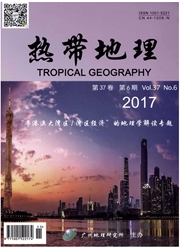

 中文摘要:
中文摘要:
现代宗教已经越来越多地与世俗社会产生不同形式的联系,然而各种宗教世俗化现象及相关理论却一直未得到国内外宗教地理学者的重视,甚至对其存在极大误解或片面解读。文章梳理了庞杂的西方宗教世俗化概念和理论,指出现代性和宗教的关系不能简单理解为后者被动迎合前者的破坏或压制,事实上两者可能是相互促进、能动地协商的关系;认为应避免混用中文语境下的世俗化概念与西方世俗化概念,以免产生错误解读。世俗化理论对宗教地理学研究有益,能为分析和解释现代宗教提供一个有力的理论框架。但该理论框架却还未被充分利用来揭示当代世界宗教变迁的多元性和复杂性。因为,现有研究1)存在地方偏见;2)存在文化偏见;3)主要基于定量分析和大尺度统计数据,缺乏深度的定性分析;4)实证基础薄弱,缺乏具体、系统地对特定地理环境(特别是非西方)下宗教变迁原因和过程的探讨。故此认为未来宗教变迁研究的注意力应该更多放在非西方社会及其宗教,利用定性研究方法深度剖析中观和微观尺度上的宗教变迁过程和机制,而这正是地理学者能发挥其优势的地方。
 英文摘要:
英文摘要:
Modem religions have increasingly developed various bonds with the secular society. However, different kinds of secular phenomena and the related theories have not been given enough attention by religious geographers in and out of China. Sometimes geographers even have big misunderstandings or one-sided interpretation. This paper reviews the huge body of western literature on secularization theories, pointing out that the modernity-religion relationships cannot be simply understood as the latter passively accept modernity's damage or depression. In fact the two probably could be mutually enhanced and actively negotiated. This paper argues that avoiding mixed usage of Chinese and western "secularization" concept is important for avoiding wrong interpretations. Secularization theories are beneficial for geographic research by proving a powerful framework for analyzing and explaining modern religions. However, this framework has not been fully used for explaining the diversity and complexity, because the existing research is: l) place-biased, 2) culture-biased, 3) mainly based on quantitative analysis and large-scale and lacking in-depth qualitative analysis, and 4) lacking empirical research and systemic investigation into the reasons and processes of religious change in specific geographic environments (especially the non West). Therefore, in future more research attention to religious change should be put to non-western society and its religions, using qualitative research methods to analyze processes and mechanisms of meso-scale and micro-scale religious changes. This is where geographers could use its advantages.
 同期刊论文项目
同期刊论文项目
 同项目期刊论文
同项目期刊论文
 期刊信息
期刊信息
